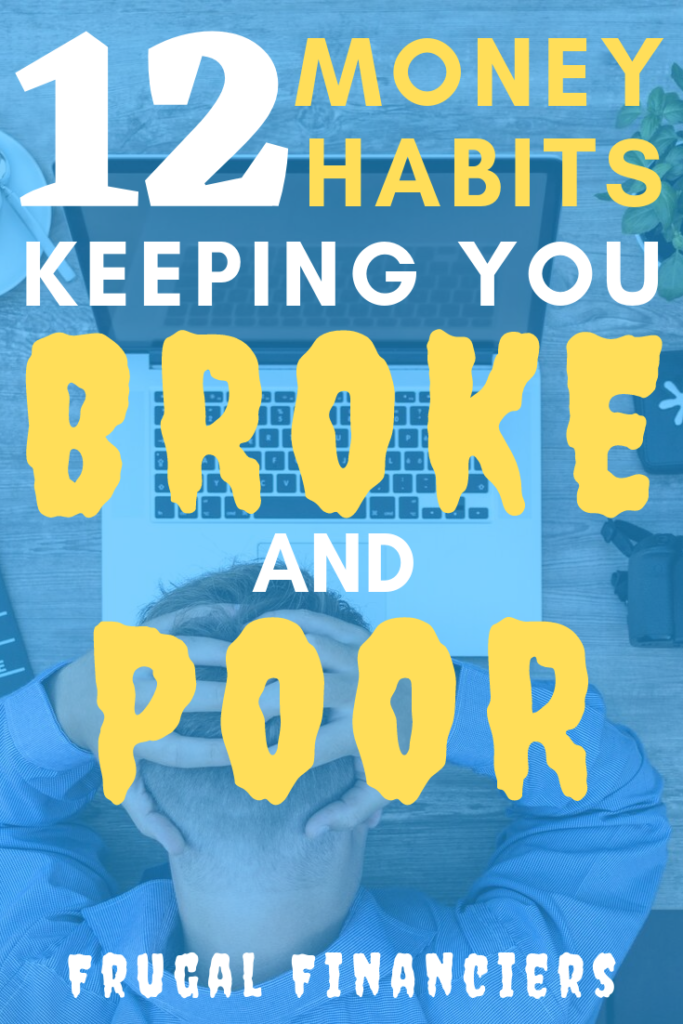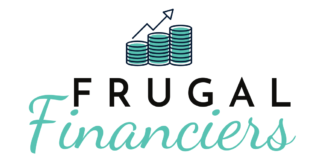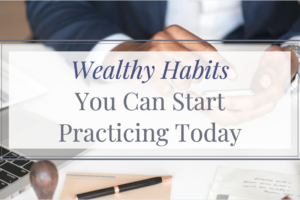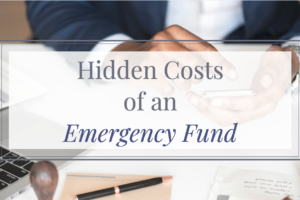A big part of building wealth is simply your mindset. And, there may be habits keeping you broke if you have the wrong mindset.
There can be the limitations of having a low salary or being up to your eye balls in debt.
But, there are certain habits that can lead you to wealth or keep you broke.
There are plenty of people out there who make enough money but just don’t practice good financial habits.
Here are eleven habits keeping your broke and poor:
- Don’t have a budget
- Not aware of spending habits
- Spending too much money on stuff you don’t need
- Holding on to stuff giving a false sense of worth
- Buying cheap or quantity instead of quality
- Don’t have long-term goals
- Not investing extra money
- Don’t pay off your credit card balances
- Don’t have a financial plan
- Lack confidence discussing money
- Think negatively about money
- Don’t value your time
Habits are all about things that you do unconsciously.
We may think consciously about saving enough for retirement and building out wealth but it’s usually the unconscious habits that carry us through each day.
You Don’t Have a Budget or Keep It Up to Date
If you don’t have a budget, how do you know much money you’re earning, spending and saving?
Without a budget, it is very difficult to accomplish your financial goals.
A budget is all about knowing how much you earn so that you can set spending targets and hopefully save some money.
Just knowing how much
And, you have to update your budget and make changes as you progress.
If you didn’t grow up in an environment where good financial habits were taught, a budget is the first step to becoming financially aware.
You’re Not Aware of Your Spending Habits
Do you tend to overspend on eating out but underspend on groceries?
This bad habit keeping you broke tends to go hand-in-hand with lacking a budget.
While you can’t change how much you earn in the near-term, you can definitely change how much you spend.
Especially non-essential expenses, like eating out, entertainment, and other expenses that are more wants than needs.
It’s a lot easier to spend more money when you don’t know how much you’ve already spent.
Additionally, if you know where you tend to spend too much money, you can be hyper-focused on those areas when you’re making purchases.
You’re Spending Too Much Money on Stuff You Don’t Need
Have you ever bought something that you never end up using.
We’ve all had those purchases that we think back on like why the hell did I buy that?
These types of purchases can really hurt in the long-run because it may feel like not a big deal in the moment.
That souvenir was only $20 that you ended up putting in a closet.
No big deal, it’s only $20.
But, if you would have invested that $20 instead, you could have doubled it in 10 years.
That might not seem like much but if you start to add up all of the unnecessary purchases plus investment returns, it can become a big amount.
You Hold On to Stuff Giving You a False Sense of Wealth
Have you ever been to someone’s house and it’s packed full of stuff?
Or, maybe you’re the one with a bunch of stuff in your house.
When people buy a lot of stuff that they keep in their house, it can create a sense of being wealthy.
We have two cars, a garage full of tools, a boat, skis and snowboards, bicycles, decorations all around the house …
The is can really go on.
And, if you’re doing this, you may feel more wealthy than reality.
You have the illusion that you’ve bought all this stuff so I must be fine financially.
Buying stuff is one of the habits keeping you broke if you feel like all of that stuff means you’re wealthy.
Only the money you have in investments and assets is an indication of your wealth.
Buying Cheap or Quantity Instead of Quality
Have you ever bought something only for it to break and have to buy another one?
We’ve done this many times in the past.
Instead of paying more for something, we buy the cheap version.
But, then it breaks and we have to buy another one.
An easy example is sunglasses.
You buy a cheap pair and you accidentally drop them instantly breaking them.
Time to buy another cheap pair.
What if you just bought one nice pair and they outlast all of your cheap pairs?
In the long-run, you’ll likely be better off purchasing quality items and even food.
You’re also more likely to take care of more expensive items.
Who cares what happens to your $25 sunglasses, right?
But, what about the nice pair that cost $150?
Purchase cheap and you may end up spending more money in the long-run.
It’s similar with quantity too.
Why buy five nice t-shirts when we can buy 20 t-shirts for the same amount?
But, you’re probably only going to wear five shirts or those five shirts may even outlast the 20 shirts.
You Don’t Have Long-Term Goals or Your Goals Are Vague
This is probably more common among younger people and definitely happened to us.
Either you don’t have goals at all or your goals are very vague about the future.
If you don’t have any goals, you’re likely to be more care-free with your money.
With no goals, you have no reason to spend less or save more.
And, what about vague goals?
You want to retire one day.
Okay, great.
What do you need to do to retire?
You want to pay off your debt.
Okay, great.
What do you need to do to pay off your debt?
Goals are not hopes and dreams.
It’s about doing some research and setting specific targets.
In both cases, of having no goals or having vague goals, you’re more likely to spend your money that is not beneficial long-term.
When you have specific, targeted goals its a lot easier to tell yourself, I’m not going to buy that because I need to put this money towards my debt.
Specific goals give you a reason to consciously choose how you allocate your money.
Check out our post on how to set financial goals.
You’re Not Investing Extra Money
Do you have money sitting in a low-yielding savings account?
If so, why?
If you don’t need that money in the near-term, you should be investing it in assets that provide a better return.
The goal of banks is holding your deposits (cash) for as little cost as possible.
It’s how they are able to make money.
So, don’t hold your money in cash or in a savings account.
Invest your extra money.
It is one of the few ways that you can build your wealth.
Investing involves risk.
But, you likely will not achieve your financial goals without investing your money.
You Don’t Pay Off Your Credit Card Balances
Keeping a credit card balances and paying interest is one of the worst habits keeping you broke.
The high interest rates on credit cards can significantly damage your finances, causing you to spend extra money on interest each month.
If you can, you should be paying off your credit card balance each month.
Some people just don’t realize that they’re wasting money because they think they only need to make the minimum payment.
Or, they don’t realize how much extra money they’re spending on interest.
A lot of people do struggle to pay off their credit card balance though.
If you are struggling to pay off your balance each month, you may have to create a temporary plan until you can pay down the balance.
It may require you spending only on the essentials until the card is paid off.
But, this will save you money because you won’t be paying interest anymore.
Check out our posts on debt:
- Is There Good Debt and Bad Debt?
- How to Get Out of Debt
- What Debt Should You Pay Off or Pay Down First?
You Don’t Have a Financial Plan
While you may think a financial plan and a budget are the same, they are different.
And, not having a financial plan might be one of the habits keeping you broke.
A budget is focused more on next month or quarter while a financial plan is focused on the next decade.
Your financial plan should be a model for how you’re going to achieve your financial goals.
It should lay out how your investments are expected to grow over time and how you plan to build your wealth.
You Don’t Feel Confident Discussing Money
Unfortunately, a lot of us don’t feel confident talking about money and finance.
This habit can be keeping you poor because it’s a negative mindset.
Most of us did not grow up in an environment where financial literacy was important.
You probably remember learning about the make-up of a cell and the differences between a plant cell and an animal cell.
But, compounding interest or debt amortization were not covered.
This has created a lack of confidence in talking about money and finances.
But, how are you going to achieve your financial goals when you’re afraid of money?
Once you learn the basics about money and that a lot of it is about how you spend and save, you gain some confidence.
That confidence is key reaching the financial situation you desire.
You Think Negatively About Money
One of the common habits keeping you poor potentially is negative thinking about money.
Money is evil.
This is one of the common sayings that we’ve heard before.
Unfortunately, people will definitely do evil things for money.
But, money is really just a tool for exchanging goods and a store of value.
You cannot think that money is bad but then you also want money.
You Don’t Value Your Time
We wanted to save this one for last.
Your time is the one of the most valuable commodities that you have in life.
For a job, we exchange time and skill for money.
But, you can easily develop or already have the habit of not valuing your time.
Filling out surveys is a great example of not valuing your time.
While the little bit of money sounds nice, think about what you could be doing instead.
If your true goal is to make more money, you should be using that time completing surveys on developing your skills and knowledge.
Your time is your greatest asset.
It can be used to build something or learn something.
If you spend ten hours filing out surveys, think of what else you could have used those ten hours for to better yourself.
Focus on the big-stuff, not the small stuff.
A survey may make you $5 today but a new skill could make you $5 more an hour for the rest of your working life.
Final Thoughts on Habits Keeping You Broke
There are plenty of potentially harmful habits keeping you broke.
The goal is to be aware of them and try and to form habits for building wealth.
Check out our post on things you can do to improve your finances today which include some great habits to form.





Leave a Reply
Your email is safe with us.
You must be logged in to post a comment.